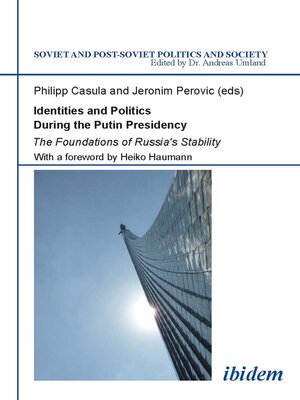Identities and Politics During the Putin Presidency
ebook ∣ The Foundations of Russia's Stability. With a foreword by Heiko Haumann · Soviet and Post-Soviet Politics and Society
By Philipp Casula

Sign up to save your library
With an OverDrive account, you can save your favorite libraries for at-a-glance information about availability. Find out more about OverDrive accounts.
Find this title in Libby, the library reading app by OverDrive.



Search for a digital library with this title
Title found at these libraries:
| Library Name | Distance |
|---|---|
| Loading... |
How could an undemocratic regime manage to stabilise Russia? What is Putin's success formula? What are the symbolic and discursive underpinnings of Russia's new stability? Many outside observers of Russia regarded the authoritarian tendencies during the Putin presidency as a retreat from, or even the end of, democratisation. Rather than attempting to explain why Russia did not follow the trajectory of democratic transformation, this book aims to attain an understanding of the stabilisation process during Putin's tenure as president. Proceeding from the assumption that the stability created under Putin is multi-layered, the authors attempt to uncover the underpinnings of the new equilibrium, inquiring especially about the changes and fixations that occurred in the discourses on political and national identity. In doing so, the authors analyse the trajectories of the past years from the traditional perspective of transitology as well as through the lens of post-structuralist discourse theory. The two approaches are seen as complementary, with the latter focusing less on the end point of transition than on the nature of the mechanisms that stabilise the current regime. The book therefore focuses on how nationalism became an increasingly important tool in political discourse and how it affected political identity. "Sovereign democracy" is seen by many contributors as the most explicit manifestation of a newfound post-Soviet identity drawing on nationalist ideas, while simultaneously appeasing most sectors of the Russian political spectrum.







